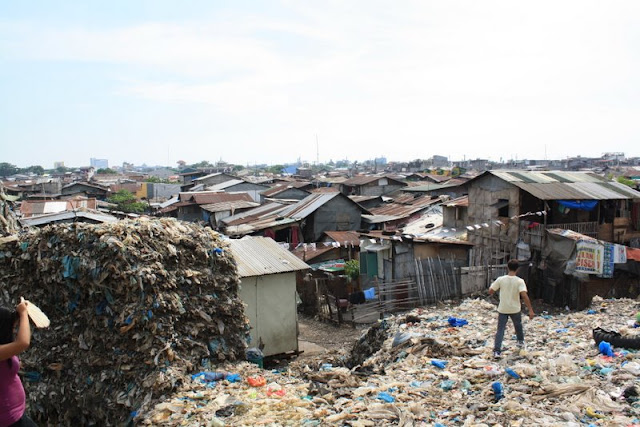and sorry, folks. I got nothing to bring you joy. Instead, I have pictures of children playing on dump sites and swimming in polluted waters. get excited for a trip to Letre, Malabon, population: 55,000, poverty: overwhelming.
You might recall that I mentioned Malabon before - it's a town built on a dump site, where a former fishpond was filled with trash until it became somewhat like a solid surface. The settlers then built their houses on top of the trash. The windows in the community are weirdly low, and the ceilings of many of the houses awkwardly close to the ground, because every year the occupants have to pile up more trash and concrete on the ground in order to stave off the rising waters. There are regular floods and fires, and if the owner of the land ever decides to use it for something, the squatters - informal settlers - will be relocated to whereever the city or landowner can find to put them. Sometimes Malabon makes it into the news because settlers forcibly resist relocation, with violent results.
As you would expect in a community built on a trash heap, hygiene and health are huge, huge issues. Common diseases include childhood diarrhea, dengue, and leptospirosis. Leptospirosis is also known as "the one spread through rat piss," in case you were wondering.
"Stepping stones" across the trash-filled waters.
Electricity is also a big issue - many informal settlements will illegally tap electricity, which is dangerous and can help cause fires. Speaking of fires, one of the most amazing things to me when traveling through these communities is that anybody manages to survive the fires that occur. The streets are so very narrow.
Water delivery is also a big issue. It can be carried in by hand, like this man is doing, or delivered by portable hose, or there can be an installed hose. But any of those methods can deliver contaminated water.
See the blue line in the lower right-hand corner? That's a water pipe, running right through the waters of Malabon, filled with trash and human waste. A tiny crack anywhere in that hose will cause serious health problems. Note also the skinny cat, the neatly mended old shirt, the woman doing laundry in front of her home - other characteristics of life in an informal settlement.
Speaking of the trash, it's everywhere. and it smells terrible. but it's not actually overpowering until you reach the mountain.

That's what the young women I interviewed, who were showing us through the community, called it. "Ate Camila, we're going to the mountain of trash now!"
And as we gingerly picked our way across the top - a very squishy experience - they asked, "Ate Camila, you aren't scared?" And well, yes, I was scared - scared I was going to step in something I'd never forget, that I was going to slip and fall, that my injured ankle would give out. but I wasn't too scared to keep going, so we climbed up to the top for a panoramic view of Malabon.
Old men, beneath the shade of a tarp, were picking through trash, while small children climbed across the top, sorting through looking for valuables, or maybe just playing - or both. It involved a lot of running and laughing, while I was hyperventilating at the sight of tiny feet in flimsy flipflops on top of that poisonous filth. but man, were those kids adorable.
A river runs through the middle of Letre, crossed by these flimsy bridges.
The water is also full of garbage and naked children swimming - with a great deal of enthusiasm and some rather skillful dives. However, I think posting those pictures might earn me a child-pornography arrest, so you'll have to take my word for it. Diving from the shores into the water not a foot away from a floating island of trash.
Some parts of Letre are rather more developed - you can see much more concrete in this section, for instance. But they face the same flooding problems.
Are they carrying rocks in, to build up the ground and fight the flooding? or carrying them out? I didn't think to ask.
And throughout it all, poverty, and ramshackle houses, and unattended children, and hard, hard work, and of course, the trash. But as I said in my last post on Malabon, the experience was surprising. The young women I spoke to about their volunteer work passing out condoms and providing sex education, the mothers in the maternal hospital, the kids shouting and following us, begging for me to take pictures of them and asking for my name, all the patient adults who smiled and moved aside to let us through the streets - I remember the people, not the trash.
Oh, and the sense of guilt. I remember that, too.












No comments:
Post a Comment